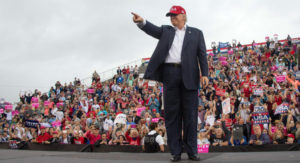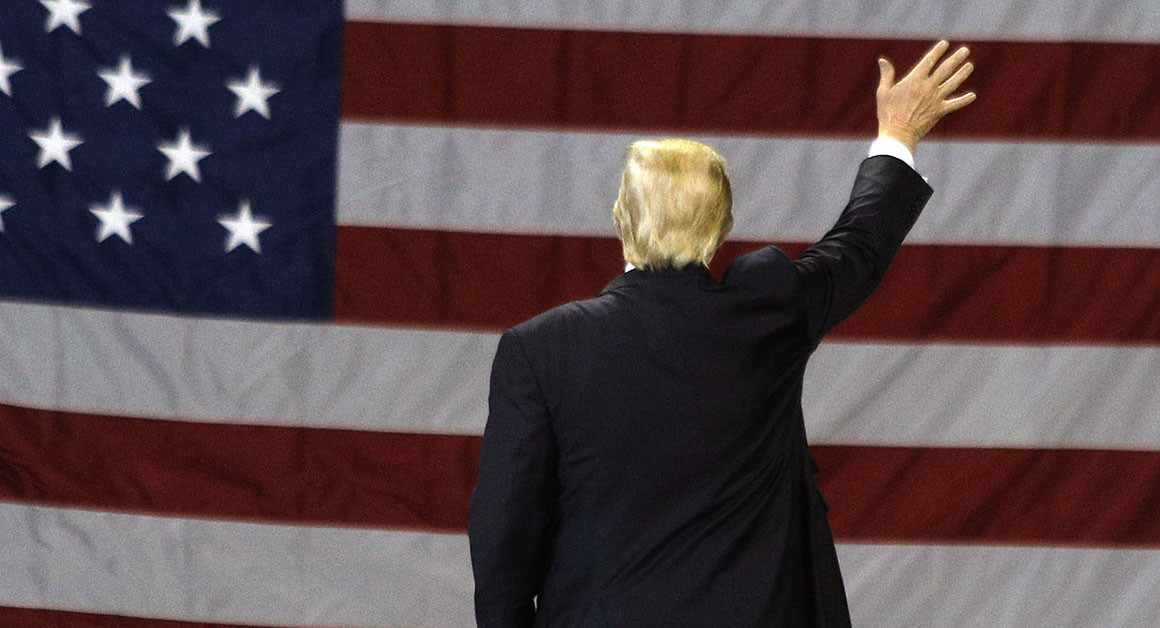Publicado en politico.com
I grew up surrounded by Chávez’s alternate reality. Now I’m  watching one consume the United States.
watching one consume the United States.
Speech is a powerful lord that with the smallest and most invisible body accomplished most godlike works. It can banish fear and remove grief, and instill pleasure and enhance pity. Divine sweetness transmitted through words is inductive of pleasure and reductive of pain.” – Gorgias
If you think the postfactual world is a recent development, then you should see how Hugo Chávez was and is still mourned in Venezuela. One can safely say that the Venezuelan revolutionary, who from 1999 to 2013 presided over the largest oil boom in history in the most oil-rich country in the world, and yet left behind a hungry, ailing, economically ruined society, was a downright catastrophe for his country’s citizens. A factual catastrophe, as it were. Yet many there, especially the very poor, who are the hardest hit by Chávez’s failed policies, still idolize him as a savior. Some have even set up a religious cult around him.
Against all reason and evidence, for more than two decades they have been living in a postfactual universe.
Meanwhile, the developed world seems to be discovering this concept for the first time. As President Donald Trump and his team of surrogates lay waste to one fact after another, the Western media is brimming with lamentations about our entry into the post-factual era and eulogies for the “factual” one we left behind. In these essays, post-truthism is typically defined as some sort of illness of objectivity, brought on by a rise in subjectivity and sheer emotion. “The truth has become so devalued,” they say, “that what was once the gold standard of political debate is a worthless currency.”
But take it from someone who grew up in Venezuela, surrounded by a fictional universe of Chávez’s making: These interpretations are all wrong. For one, they assume that the scientific understanding of the world is somehow the natural route—the obvious one, the longstanding one—when in fact, blind faith was until very recently the unvarying constant of civilization. For most of our human history, we lived to survive, and when faced by doubt we were not embarrassed by beliefs that required no verification. But now, late in the age of Google, we are led to believe that that which cannot be verified is somehow immediately worthless. As if we really live in the complex world of facts, and not the more human world of belief.
Indeed, these essays completely ignore the true merit of post-truthism: Its narrative coherence—an easy consistency that the behemoth of data spouted at us by the mainstream media frustratingly lacks. It is precisely this coherence, this simplicity in a world of complexity, that makes fiction in the eyes of many worthier than reality.
As former President Barack Obama said in a recent New Yorker interview, “The new media ecosystem ‘means everything is true and nothing is true.’” Consider wealth inequality. Depending on where you read about it, and often simultaneously from the same source, you will discover that the Gini coefficient has been steadily rising across the developed world, though specially in America, because of—what? Robots? Trade with China? Reaganomic deregulation? Sheer financial depravity? Illegal immigration? Taxes? Even for an economist such as myself, the answer is unclear. (And so, then, are the solutions.) It might be all of the above, but one cannot know for sure: The question remains open. And so the truth then becomes that all of it is true—but also maybe none of it is true.
But then Trump says that the explanation is much more simple: It’s NAFTA, and China. “We’re living through the biggest job theft in the history of the world folks,” he says. We can fix it easily. In terms of conviction and coherence, who can beat such clarity of vision?
Many people have been too eager to blame post-truthism and the rise of Trump on a deficiency of education. On sheer showmanship and “sentimental politics,” whatever that is. On the rise of new, data-driven polling and marketing techniques. Some even blame Hollywood. In short: A stupefied populace, prodded listlessly by social media and big data, voted for Trump precisely out of the stupidity of his rhetoric.
«To Trump voters, a fake reality—especially one laden with obvious enemies and golden promises—is better than nothing, or more of the same.»
But this is beyond offensive: It is intellectually lazy. It attempts to explain the Trump phenomenon only by the supply-side of the equation—with what he was proffering. What about the very human demand he tapped into? It is not an army of gullible slouches and racists on sofas with guns, smartphones and a brief vocabulary who brought Trump to power—but rather a large, disenfranchised, chunk of society that was promised meaning through social mobility, got none of it, and after almost a generation of stagnating wages still had no clear, coherent answer to the question: Why, after so many years of work, am I still suffering?
Trump’s Republican primary contenders couldn’t answer that question. Hillary Clinton couldn’t either. And certainly none of them proposed a fix—or a new ethos to replace the flailing “American Dream” ideal. Trump did all of the above—constructing an alternate reality that gave his supporters a concise answer to their question, and the hope of a solution. It doesn’t matter that it’s all bogus. To Trump voters, a fake reality—especially one laden with obvious enemies and golden promises—is better than nothing, or more of the same.
***
“Why am I suffering?” It is this question that has always prompted the disheartened to search for faith. For most of our history, religion gave them the answer they needed (i.e. “I suffer because I am sinful”). But modern populism in the vein of Trump and Chávez can do the same. When citizens ask these leaders why are they suffering, they too get a simple answer: “I suffer because of them.”
Like religion, populism asks for blind allegiance, dismisses truth as the unconditional value of meaning and arises from a certain unverified, mythological coherence. And like religion, populism promises a distant resolution—one that never comes, of course, but is constantly dangled in front of its supporters, who are soothed by the expectation.

The main focus of populist policy is therefore to tend to these people waiting—to give them a reason for their suffering, to verbally recreate the post-factual world of their beliefs, to make them feel like they are moving forward. Populism is not a systemof facts or solutions, operating in the complex world of policy and legislation, but rather an interactive fiction, borne of posturing and symbolism, where whole countries can become not what they are, but what they believe themselves to be.
It should therefore not surprise you that the first items in Trump’s presidential agenda are patently ineffective. A wall to Mexico, banning Muslims from entering the country and attacking the media and intelligence agencies are about as useful in terms of public policy as building a pyramid in the desert. But they pack quite the rhetorical punch and do reinforce the fictional recreation. They are good, populist, policy.
I’ve seen this all before. If I were to recount my experience growing up under Chavismo I would be unable to frame it in the stereotypical terms of terror and loss: “On Monday they took my neighbor, two months later they took my uncle never to return, three years later they took me and sent me to war.” This is not a story only of destruction.
«Chávez might have demolished the country’s institutions and economy, but in their place he put in a rhetorical reality that was worth more to his supporters than the factual, material one he destroyed.»
Instead I would have to say that on December 1999, the year Chávez came to power, my country’s name was changed from Venezuela to the Bolivarian Republic of Venezuela. That in 2002 Columbus Day was renamed the Day of Indigenous Resistance. That in March 2006 the coat of arms was changed to one where its horse galloped to the left. That a year later the time zone of the country went back 30 minutes. That Bolívar, our founding father, an aristocratic admirer of the British Empire, suddenly became an anti-imperialist leftist according to official propaganda, textbooks and city graffiti. And that people all around me relentlessly nodded to all this gobbledygook.
This was all pantomime to a massive corruption industry working behind the curtain, one which stole, at its lowest estimate, the unimaginable amount of 300 billion USD and utterly ravaged my homeland. But according to official propaganda, it was always the American imperialists, with the tacit support of a treasonous Venezuelan middle-upper class, doing the destroying. This fiction was so aptly portrayed, and indeed so convincing, that the majority of Venezuelans did not care to peek behind. Chávez might have demolished the country’s institutions and economy, but in their place he put in a rhetorical reality that was worth more to his supporters than the factual, material one he destroyed. So in fact this is another kind of story: one of a country slowly becoming delirious.
How can nothing but promises and enemies be worth more than concrete progress? Because after survival, most humans crave not wealth but meaning—a sense of what to do as they keep pushing the boulder uphill. In Venezuela, for the historically poor and disenfranchised, Chávez offered a potent alternative to the vacuous gradualism of other politicians: He offered revolution. One which exhorted ordinary people to get involved and with a vengeance; one built not through policy, but through unaccountable, impassioned rhetoric. A revolution that was happening as long as you believed it was.
«I watched the delirium spread like wildfire through a population, infecting extremists and moderates alike.»
The same thing is happening now in America. “Work hard and you will achieve, society will achieve”—so long the meaning of life dangled by liberal democracies (and known as “the American dream” in the United States) has become obsolete. With that gone, it was not long before those left behind fell under the populist spell Trump was conjuring. Like Chávez, Trump offers his supporters not details, policies or laws, but faith. The swamp will be drained, he promises, and walls will rise to protect and shelter, and ruined factories will begin their clanging anew. It’s all empty rhetoric. But as long as you believe it, it is already happening. Who can say that post-factual worlds do not undergo post-factual improvements?
You might be thinking that Trumpism cannot possibly endure, that

the president’s most diehard supporters will eventually release themselves from this deception, and that American moderates will never succumb to it. But do not to underestimate the power of fiction. I watched the delirium spread like wildfire through a population, infecting extremists and moderates alike. And I watched it go on and on and on. Even today, 52 percent of Venezuelans still view Chávez positively, despite daily and yearly evidence in the form of increasing scarcity, crime and illness to the contrary.
Remember: Delirium is contagious. It is self-enforcing. It feeds through the natural channels of society’s networks effects. Looking through history one can find many examples of civilized nations being rhetorically driven unto dementia and total war. Like Venezuela, yes. But also, like Russia in the early 20th century. And yes, like Germany in the 1930s. Reasonable people in these countries thought they’d be able to resist the irrationality. They couldn’t. Do not assume the United States will not be next.
***
You should therefore see Trump’s increasing war against the media and established fact for what it is. Not as a case of presidential derangement, or even a certain carelessness about what is factual. Not even as some sort of obstinate demolition. It is something else altogether. Like all populists, Trump is motivated mainly by the construction of a fiction. His is a carefully designed plan to recreate for a large enough chunk of people an alternative reality in which there really is success, there really is vengeance, there really is a sense of improvement. For himself and for his audience, this suspicion of improvement, like the placebo effect that begins before a drug begins to work, is good enough. And to your dismay, durable enough also.
«For Trump and his audience, suspicion of improvement, like the placebo effect that begins before a drug begins to work, is good enough.».
Stopping the delirium will not be easy. I wish I could say something similar to what Alberto Barrera Tyszka, the famed Venezuelan novelist, said the year Chávez died: “We live in a complex country, and only complexity can save us.” But in this case what you, Americans, need is simplicity. Coherence. A sense of purpose with which moderate Trump supporters—your best allies in this mess—can align themselves.
Constantly trying to disprove, on a daily basis, what Trump says will only bait people into their confirmation biases. It will increasingly entrench moderates on both sides unto abstention or, worse, the extremes. What you need is a powerful message with which to substitute a true plan for a false spell.
Luckily for you the truth is all the more urgent now. Facts may be complicated, but truth, when earnest, can also be simple. In these times we live, during one of the most potent disruptions society has ever lived in terms of technology, culture and the economy, the priority has to be safeguarding a disappearing middle and working class. Go to them. Speak to them. Gain their trust again. Rescue from its ruins the true American dream—the narrative that made your greatness possible—and present it to them anew. But mean it, this time















3 respuestas
Thank you for every one of your labor on this site. My daughter delights in doing research and it is simple to grasp why. We notice all about the compelling means you convey useful information through the web site and as well as recommend response from the others about this situation and my child is in fact becoming educated a lot. Enjoy the rest of the new year. You have been performing a useful job.
This design is wicked! You certainly know how to keep a reader entertained.
Between your wit and your videos, I was almost moved to start my own blog (well, almost…HaHa!)
Excellent job. I really enjoyed what you had to say, and more
than that, how you presented it. Too cool!
When someone writes an post he/she maintains the idea of a user in his/her brain that how a user can understand
it. Therefore that’s why this piece of writing is great.
Thanks!